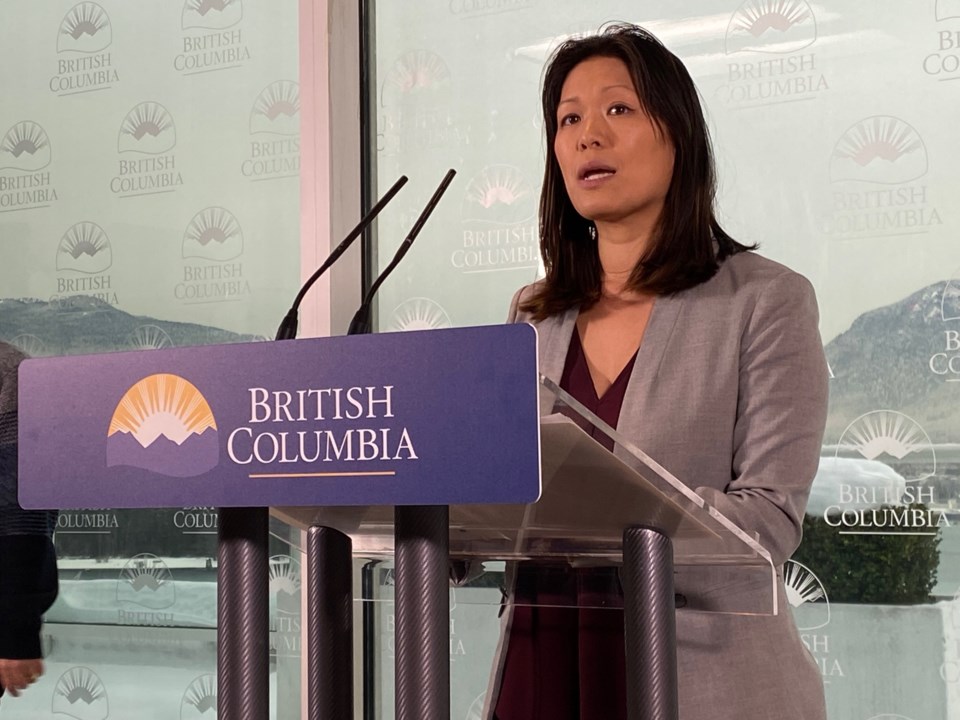Significant snow and freezing rain is expected to hit the South Coast, threatening the lives and well-being of people experiencing homelessness while crippling access to roads for emergency responders.
Beginning Thursday night and through Friday, Environment Canada is expecting 20 to 30 centimetres of snow. The snow will change to freezing rain by around noon Friday in Vancouver and by evening in the Fraser Valley, where cold air will linger longer. Environment Canada meteorologist Bobby Sekhon said the freezing rain could last 12 to 36 hours depending on the area.
The weather is expected to cause significant and widespread disruption — a first test for Bowinn Ma, B.C.'s new Minister of Emergency Management and Climate Readiness.
“Our government is doing everything that we can to make sure that people are safe and kept warm while we weather these storms," said Ma, at a press conference on Thursday afternoon in Downtown Vancouver.
"Events like this are an example of the important coordination role of this new ministry. We’ll continue to work together to strengthen our preparedness and mitigation.”
Ma’s mandate with respect to emergency response, issued Dec.7, is to “support urgent coordinated government response to communities in times of emergency and review systems to ensure they are prepared for urgent response, incorporating lessons learned from previous emergencies.”
The minister held the press conference with officials from the River Forecast Centre and Environment Canada, as well as Minister of Transportation and Infrastructure Rob Fleming.
Ma’s ministry incorporates what is formerly Emergency Management BC, once a division of the public safety ministry.
She said her ministry, formed this month in response to a growth of powerful weather events, has been in contact with 21 communities to coordinate warming centres for people without shelter. The provincial government offers financial support to non-profit groups and municipalities with respect to homeless shelters. Ma was unable to provide an estimate on how many people are at peril with this latest round of inclement weather.
Already 'challenged' road contractors to face worsening conditions
The provincial government is also responsible for clearing snow and ice from highways.
After the snow, the rain is expected to freeze on impact, creating a sheet of ice on roads and highways. South Coast residents from Vancouver Island to the Fraser Valley are being warned of the potential for highway closures.
Fleming said Highway 4 to Tofino and the Malahat Highway will be most impacted by freezing conditions. He also said highways out of the Fraser Valley to the Interior (Trans Canada, Coquihalla and Crowsnest) could be dangerous. The ministry is warning these highways could be closed.
Road travel advisories have been issued for the Lower Mainland, southern Interior and southern Vancouver Island. People are being asked to avoid non-essential travel until at least Saturday afternoon when temperatures will have warmed.
Fleming said highway snow-clearing contractors have been "challenged" by recent snow storms (Lower Mainland bridges were not adequately plowed leading to accidents and closures) and the prospect of snow and freezing rain over the next two days will be a further test. He said contractors will be “fully deployed” but avoided answering questions as to whether there is enough snow clearing equipment on hand for Lower Mainland highways, in particular.
Asked if he would be conducting a special review of the snow-clearing contracts, Fleming said reviews are done regularly.
Ministry staff at the press conference defended highways left covered with compact snow, stating that is an acceptable standard even though winter tires are not mandated in the Lower Mainland.
The ministry said people who choose to drive should ensure vehicles are fuelled up and charged, and have extra water, food and necessary medications. And they “should be equipped with winter tires with adequate tread.”
Drivers are also asked to provide space for maintenance contractors on highways and refrain from passing equipment in operation until it is safe.
Disruptions expected for electricity, aircraft and ferries
The rain is also expected to freeze on tree branches, leading to what BC Hydro described as widespread power outages.
Although not a provincial responsibility, Ma said she has spoken to officials at Vancouver International Airport, where, as of Thursday afternoon, most arrivals and departures for Friday have been cancelled, adding more stranded passengers to those already in travel limbo from Tuesday’s snowstorm.
An atmospheric river is expected to usher in warm, wet air into the region, eventually bringing heavy rain on Sunday (Christmas Day). This, said Ma, is putting the River Forecast Centre on alert for flooding.
River Forecast Centre head Dave Campbell said Thursday that the prospect of moderate, localized flooding won’t begin until Sunday when melting begins in earnest. He said heavy rain will double up with melting snow. The good news, he said: snow pack in the mountains is unseasonably low.
Campbell urged people to ensure storm drains are clear of ice, snow and debris.
Meanwhile, Fleming said strong winds may cause BC Ferries to cancel sailings, a situation he said he is also overseeing.



